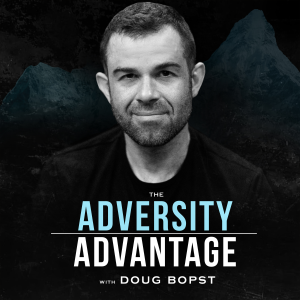
The Adversity Advantage with Doug Bopst
Health & Fitness:Mental Health

CANNABIS SERIES | Dr. Richard Miech: What Does The Research Say About Kids and Cannabis Use?
 2023-10-26
2023-10-26
Dr. Richard Miech is a co-Investigator of the NIDA-funded Monitoring the Future study. He received his Ph.D. degree in Sociology from the University of North Carolina at Chapel Hill and a MPH degree from Johns Hopkins University. His work focuses on trends in substance use, with an emphasis on disentangling how these trends vary by age, historical period, and birth cohort membership.
Since 1975 the MTF survey has measured drug and alcohol use and related attitudes among adolescent students nationwide. A nationally representative sample of survey participants report their drug use behaviors across three time periods: lifetime, past year, and past month. The survey is funded by the NIDA, a component of the National Institutes of Health (NIH), and conducted by the University of Michigan.
Today’s episode is going to be an in depth look at what the Monitoring The Future Study says regarding the trends in teenage and adolescent cannabis use, including usage patterns, perception of risk and more. We also chat about the biggest risk factors associated with cannabis use, Dr. Miech’s top findings from the study, the role nicotine plays in all of this and much more.
⚠ WELLNESS DISCLAIMER ⚠
Please be advised; the topics related to health and mental health in my content are for informational, discussion, and entertainment purposes only. The content is not intended to be a substitute for professional advice, diagnosis, or treatment. Always seek the advice of your health or mental health professional or other qualified health provider with any questions you may have regarding your current condition. Never disregard professional advice or delay in seeking it because of something you have heard from your favorite creator, on social media, or shared within content you’ve consumed.
If you are in crisis or you think you may have an emergency, call your doctor or 911 immediately.
If you do not have a health professional who is able to assist you, use these resources to find help:
Emergency Medical Services—911
If the situation is potentially life-threatening, get immediate emergency assistance by calling 911, available 24 hours a day.
National Suicide Prevention Lifeline, 1-800-273-TALK (8255) or https://suicidepreventionlifeline.org.
SAMHSA addiction and mental health treatment Referral Helpline, 1-877-SAMHSA7 (1-877-726-4727) and https://www.samhsa.gov
Learn more about your ad choices. Visit megaphone.fm/adchoices
More Episodes
Create your
podcast in
minutes
- Full-featured podcast site
- Unlimited storage and bandwidth
- Comprehensive podcast stats
- Distribute to Apple Podcasts, Spotify, and more
- Make money with your podcast
It is Free
- Privacy Policy
- Cookie Policy
- Terms of Use
- Consent Preferences
- Copyright © 2015-2024 Podbean.com





